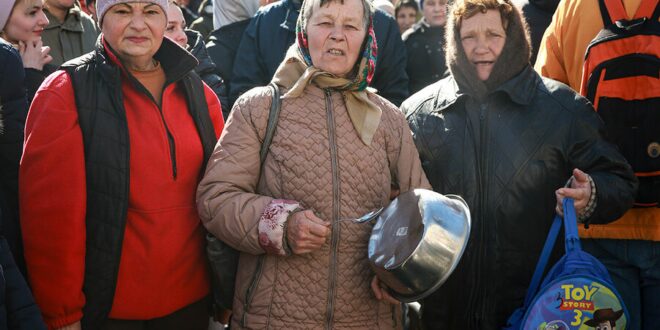Crowds are surging through the streets of Chisinau, the capital city of tiny Moldova, as pro-Russian demonstrators complain about deteriorating living standards and creeping authoritarianism by officials.
It’s just another way the war in neighboring Ukraine is destabilizing the post-Soviet region more broadly. But what makes Moldova’s situation especially dangerous is the presence of a Russian-speaking statelet, Transnistria, which broke away from Moldova after a brief war in 1992 and has maintained its unrecognized independence with Russian support ever since.
Transnistria still hosts an occupying Russian army of about 1,500 troops, as well as an enormous Soviet-era ammunition depot near the town of Cobasna, with about 20,000 tons of Soviet-standard weaponry that is desperately needed by both sides in the nearby conflict.
Moscow has repeatedly claimed that Ukraine may be preparing a “provocation” with the aim of invading the little territory and seizing that arms stockpile. Officials in Tiraspol, the de facto capital of Transnistria, say Moldova’s pro-Western government might decide to invite the Ukrainians to attack Cobasna.
For their part, officials in Chisinau insist that they are facing a Russian-orchestrated attempt to overthrow the government, using the populist opposition Shor party, which brought thousands to the streets of Chisinau last week amid raging inflation and deepening joblessness.
Rolling street demonstrations are threatening to destabilize another fragile post-Soviet state. But in this case, it’s not pro-Western protesters pushing back against what they see as an authoritarian drift by their government, but pro-Russian demonstrators complaining about deteriorating living standards – and, also, creeping authoritarianism.
Crowds are surging through the streets of Chisinau, the capital city of tiny Moldova, the poorest country in Europe. But fallout from the war in next-door Ukraine has made economic prospects even worse and aggravated social tensions.
What makes Moldova’s situation especially dangerous is the presence next to its border with Ukraine of a Russian-speaking statelet, Transnistria, which broke away from Moldova after a brief war in 1992 and has maintained its unrecognized independence with Russian support ever since. It still hosts an occupying Russian army of about 1,500 troops, as well as an enormous Soviet-era ammunition depot near the town of Cobasna, with about 20,000 tons of Soviet-standard weaponry that is desperately needed by both sides in the nearby conflict.
Moscow has repeatedly claimed that Ukraine may be preparing a “provocation” with the aim of invading the little territory and seizing that arms stockpile. Officials in Tiraspol, the de facto capital of Transnistria, say the pro-Western government of President Maia Sandu, which has made joining the European Union a top priority, might decide to invite the Ukrainians to attack in hopes that Moldova’s long-standing “Transnistria problem” might be solved. The country’s path to the EU, and even NATO, would be much simpler with that “frozen conflict” removed.
For their part, officials in Chisinau insist that they are facing a Russian-orchestrated attempt to overthrow the government, using the populist opposition Shor party, which brought thousands to the streets of Chisinau last week amid raging inflation and deepening joblessness.
Regardless of who is right, and whether there is indeed foreign influence intentionally attempting to stir up unrest in Moldova for its own ends, the war in Ukraine is bringing Moldova’s existing polarization to a new extreme. And it highlights how the conflict between Ukraine and Russia is destabilizing the post-Soviet region more broadly.
 Eurasia Press & News
Eurasia Press & News




